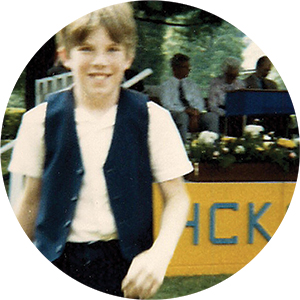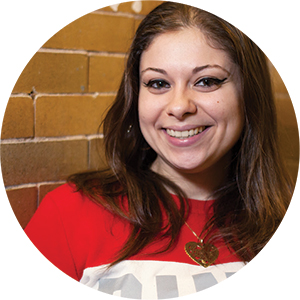Who You Support
Join us on sample date
Mirian: To People Facing Darkness, You Are Not Alone
 Today, I’m working on building myself up to be more independent. I have a job and I’m applying for school — I feel like I’m doing great. Meanwhile, the residential staff I worked with continues to advocate for me and always has my back.
Today, I’m working on building myself up to be more independent. I have a job and I’m applying for school — I feel like I’m doing great. Meanwhile, the residential staff I worked with continues to advocate for me and always has my back.
My community here helped me realize what I had in me. Once I started to see it, I just ran that marathon.
To people facing trauma and darkness, I tell them, you are not alone. If you ever need someone to talk to, there is always going to be someone there. There’s a lot to life and people have a lot of potential — they just don’t realize it. But I’ve learned, there’s so much more. Don’t give up. (Read More)
Nicholas: Meet Your Children Where They Are
 Every parent wants to have that eureka moment when all of a sudden a switch is flicked, and their child speaks spontaneously and behaves like their neurotypical peers. The reality is, it’s not so easy. It’s not parking your child into a great program and coming back to a makeover at the end of the year.
Every parent wants to have that eureka moment when all of a sudden a switch is flicked, and their child speaks spontaneously and behaves like their neurotypical peers. The reality is, it’s not so easy. It’s not parking your child into a great program and coming back to a makeover at the end of the year.
The people who we worked with helped us move away from the stigma of Liam’s diagnosis and support his learning in a way that respected his dignity as a person. The truth is, we all have mental health — we are all feeling, growing, living with real challenges. We can’t extricate the child’s mental health from the family — the child is the family and therapeutic nursery schools get that. (Read More)
Lance: How to Support Today’s Youth In Crisis
 Mental health is the first step to being a strong, resilient individual.
Mental health is the first step to being a strong, resilient individual.
Today’s youth are battling isolation, depression, bullying in schools, and the inability to express their wants and needs. They’re not being heard and lack outlets for self expression. Simply put, kids are struggling with support.
Youth who aren’t supported often run away, making them prone to criminal activities, violent gang culture, or sexual behaviors that can lead to human trafficking. This stems from youth wanting to feel included, to be loved and accepted, to be supported. We need to decrease the stigma and prevent incarcerations with youth. (Read More)
Kara: I’ve Made It This Far
 I’m 14 years old and very artistic. I love art. I’m really smart in school and my favorite subject in school is math.
I’m 14 years old and very artistic. I love art. I’m really smart in school and my favorite subject in school is math.
I was once sexually abused, and I’ve been in foster care ever since. I’m in a program because I run away a lot, but I’m working on it.
I used to hang around with too many of the wrong people, but now I know how to focus on improving myself and getting better. Instead of screaming and yelling, I work with people and explain how I feel. I talk to the staff if I’m worried I’ll do something wrong, because I trust people to help me come up with a better way to deal with how I’m feeling. I care about my treatment, and I’m working to stop doing things that could possibly hurt me. I know how to advocate for myself and stay involved with my care, and that’s given me a lot of confidence.
Tom: Don’t Give Up, You’re Not Alone
 In 1983, when I was 13, I was sent to live at a youth residency program. At the time, I wondered what I did wrong to be in this place. Today, I realize it wasn’t anything I did—it was the circumstances of the situation I was in. But thank God there was a place that went, “Yes, we’ll accept you.”
In 1983, when I was 13, I was sent to live at a youth residency program. At the time, I wondered what I did wrong to be in this place. Today, I realize it wasn’t anything I did—it was the circumstances of the situation I was in. But thank God there was a place that went, “Yes, we’ll accept you.”
What I learned there and the love I was shown has impacted me so many years later. The strength I gathered from the people there, they probably didn’t know how much they impacted me. So what I have learned is: don’t give up, you’re not alone, and there are people who want to help you. This place is there for people like you. It’s what they specialize in, they repair families. They didn't advertise it like this, but it’s true: they’re in the saving lives business.
Angela: There’s No Way to Move But Up
 When I was 14 years old, I felt very alone and didn’t think anyone could help me. I just couldn’t trust anyone. I eventually went to a mental hospital because I tried to kill myself. I was told I needed someone I could see weekly and provide me with the tools to cope with my depression, anxiety and anger. That’s when I was referenced for therapy.
When I was 14 years old, I felt very alone and didn’t think anyone could help me. I just couldn’t trust anyone. I eventually went to a mental hospital because I tried to kill myself. I was told I needed someone I could see weekly and provide me with the tools to cope with my depression, anxiety and anger. That’s when I was referenced for therapy.
When I met my therapist, things just started to click. She sincerely cared about me. Even if I didn’t have a session but still needed to talk to someone on the phone, she was there. I didn’t feel like I was just another client to her. The staff actually spoke to me, wanted to know about me, and listened to my concerns. You can tell that they really care here, and you can’t find that everywhere.

